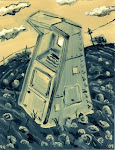

The paradox of thrift? Surely the paradox lies in being encouraged to spend what we do not have, virtual, abstract, not quite believable, real, or tangible money, assets, or coinage—coinage you cannot feel...
Two recent publications have caught my much cauliflowered ear and soothed them somewhat their rational takes on consumerism acting like balm to an auditory system much battered by insane economic advice, and irrational forecasts that see us all rising up out of the ashes of a recession that was never publicly defined as a depression and puffing hard to inflate another lie of a bubble, or two, or three. I’ve heard the authors talking on NPR and WNYC and was overjoyed to hear their clear and succinct telling of the true stories behind the outlet malls, super malls, buying American, bargain hunting, free offers, and how we all continually are being encouraged to spend and rack up further debt:
In Cheap We Trust Lauren Weber examines the cultural history of thriftiness
and in Cheap: The High Cost of Discount Culture, Ellen Ruppel Shell traces “our national obsession with the bargain from the Industrial Revolution to the modern assembly line, and from chain stores to big-box retailers who value convenience and low-prices over quality”. (WNYC web page). Click on Author names to see their interviews with Leonard Lopate on WNYC

















No comments:
Post a Comment
Please let me know what you think...